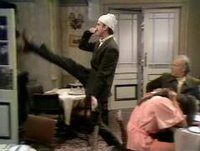 My roommate and I hosted a German girl for a few days this week. She was visiting a friend of Sarah Jo's and gamely camped out in our living room in between visits to the Bass Pro Shop, New Orleans and the local Waffle House. Kat was very cool, fascinating to listen to, and I wish I could've gotten to talk more with her. She was so cool, in fact, that my awkwardness was all the more funny in comparison.
My roommate and I hosted a German girl for a few days this week. She was visiting a friend of Sarah Jo's and gamely camped out in our living room in between visits to the Bass Pro Shop, New Orleans and the local Waffle House. Kat was very cool, fascinating to listen to, and I wish I could've gotten to talk more with her. She was so cool, in fact, that my awkwardness was all the more funny in comparison.Yesterday evening we were sitting around the dining room table talking. Somehow the topic turned to Americans' perception of European women as not shaving their legs. "Oh no!" she exclaimed. "That's not true! Some older women, perhaps, but most younger people do. See!" she said, offering her own legs as proof. We wondered how the custom came into general practice, and I mused that it was probably during World War II, when there was a nylon shortage. American women shaved their legs and drew lines down the back to fake the look of nylon stockings. Halfway though my explanation, I thought, "Oh no! Don't mention the war!" and remembered the most popular episode of the BBC's most popular sitcom: Fawlty Towers "The Germans."
Basil Fawlty, played to perfection by John Cleese, warns everyone at the inn not to mention "the war" when he hears that a party of Germans will be coming to stay. After a head injury (my memory is fuzzy on just how he got hurt—was it a falling moose head?), Basil escapes the hospital with a head bandage that makes him look even crazier than usual. He then proceeds to break his own instructions, mentioning the war at every opportunity and upsetting his guests greatly. When they ask him to stop dwelling on it, he politely reminds them that they started it. “We did not start it,” protests the German. “Yes you did, you invaded Poland,” Basil replies. He ultimately winds up goose-stepping around the dining room, finger held to his nose and long legs flailing, in the funniest impersonation of Hitler on televsion.
All this flashed through my mind while I sat at the dining room table with Kat. "Augh! The one thing you shouldn't mention to a German, and you brought it up!" I thought. The conversation moved on, and nothing else eventful happened. Was it awkward? Yes. Was it funny? Oh, yeah.



